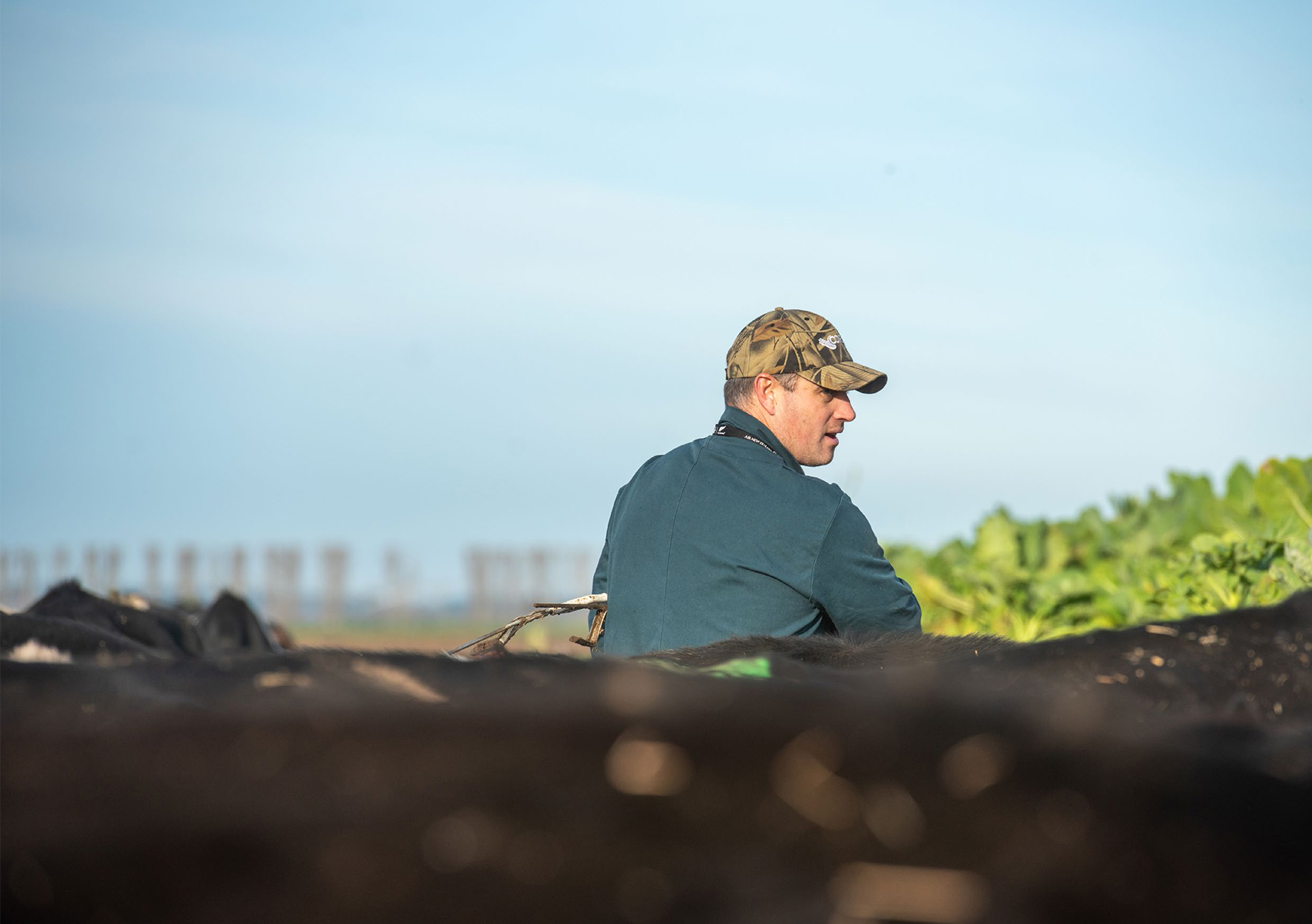
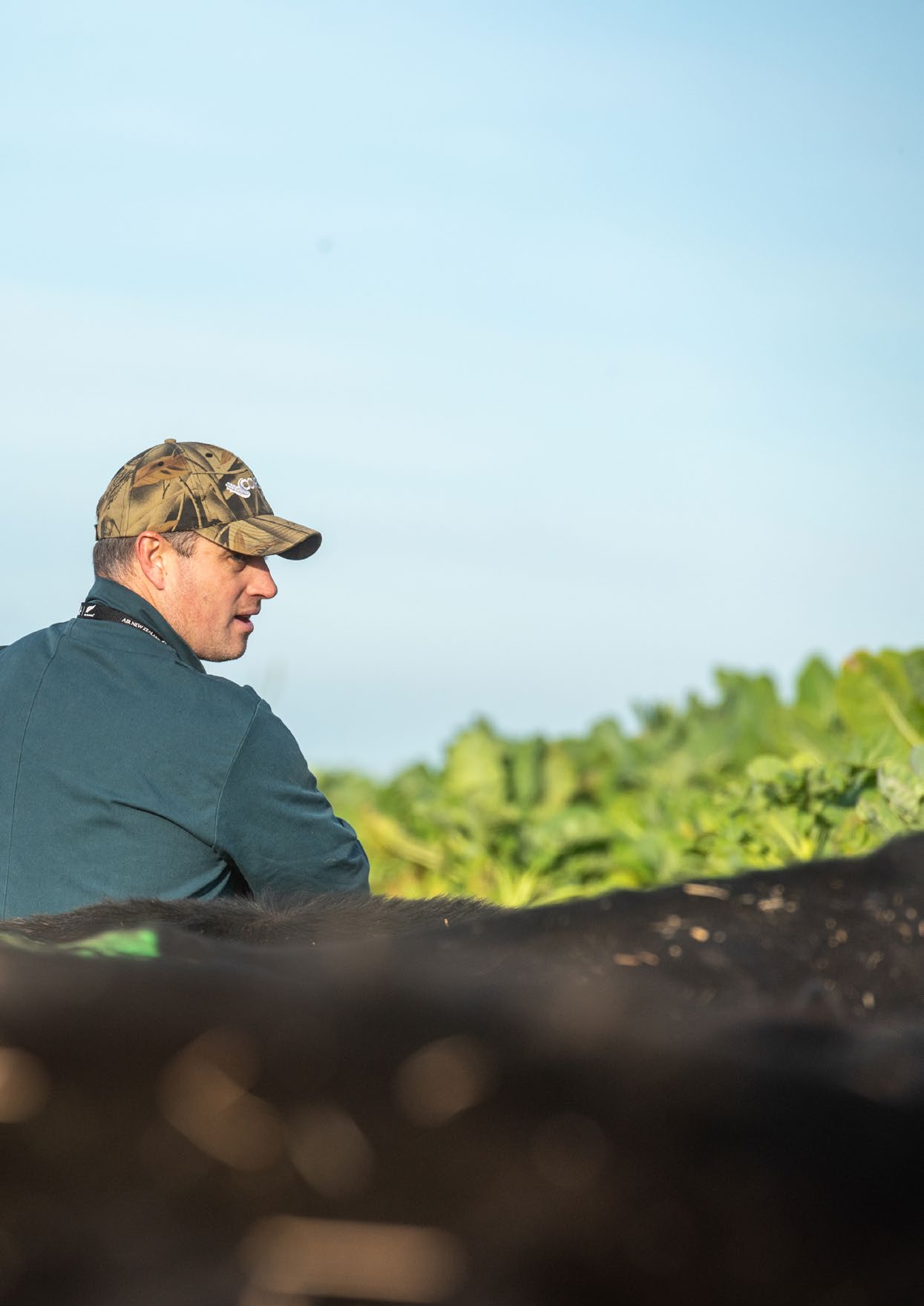
Down on the Farm
Rural life has always had its challenges, but environmental politics and the complexities of modern farming have brought new pressures. For some, the load becomes too much to carry.
By Paul Gorman
Photography by
Andrew Macdonald
When he was a kid, Sam Spencer-Bower used to help out his grandfather Marmaduke in his massive vegetable garden, just across from the farm cottage where he lived with his parents. He didn’t realise at the time that his grandad was something of a legend in Canterbury farming. His family had worked on this land ever since great-great-grandfather Marmaduke Dixon came from Claxby in Lincolnshire and in 1852 established a large farm in North Canterbury, near the gravelly north bank of the Waimakariri River.
In fact, Marmaduke Dixon was one of the first in New Zealand to irrigate his land, initiating flood irrigation from the Waimakariri before 1900. Sam’s grandfather, Marmaduke Spencer-Bower, farmed the land until he was about 95 and wrote a book about the farm and Marmaduke Dixon’s legacy. In other words, Sam Spencer-Bower — middle name Marmaduke — had a lot to live up to.
By the time his grandfather died at the age of 98, Spencer-Bower was already well on the road to taking over the fifth-generation family farm. He was studying for a degree in farm management at Lincoln University. That’s where he met his wife, Jo, who was herself from a sixth-generation farming family (her brother is former All Blacks captain Richie McCaw). At the time, Jo recalls, she liked the fact that Sam had a “sensitive side”, that he was “not a big showman”.
In 2012, the year after they got married, Spencer- Bower became Claxby’s operations manager. He and Jo urged the family to convert what had been a 1400-hectare mixed sheep, beef and cropping farm to dairy.
It was a huge decision for a family that had farmed sheep for generations. There were sound reasons to do it: “The economic future of sheep farming on irrigated flat land was grim,” explains Spencer-Bower, who is now 37. Still, without his urging, his parents might not have made the leap. That meant the pressure for success was riding largely on Sam and Jo’s shoulders. And because they were learning as they went, things took twice as long. At the end of each day, Spencer-Bower found it increasingly hard to switch off. “I felt like I didn’t want to waste any minute, I needed every spare minute to be working, to get things done.”
Around that time, Jo, who was the farm’s management accountant, started noticing that her normally thoughtful husband would get angry and upset by small things — fixating on her grammar, obsessing over a tiny mistake on a spreadsheet, or “worrying about a scratch on a ute that already had five other scratches”.
Then Sam started struggling to get out of bed in the morning. Jo would persuade him to step out the door and then head off to work herself, only to get a call from him around 10am: “I need help, I’m back in bed. Can you come home?”
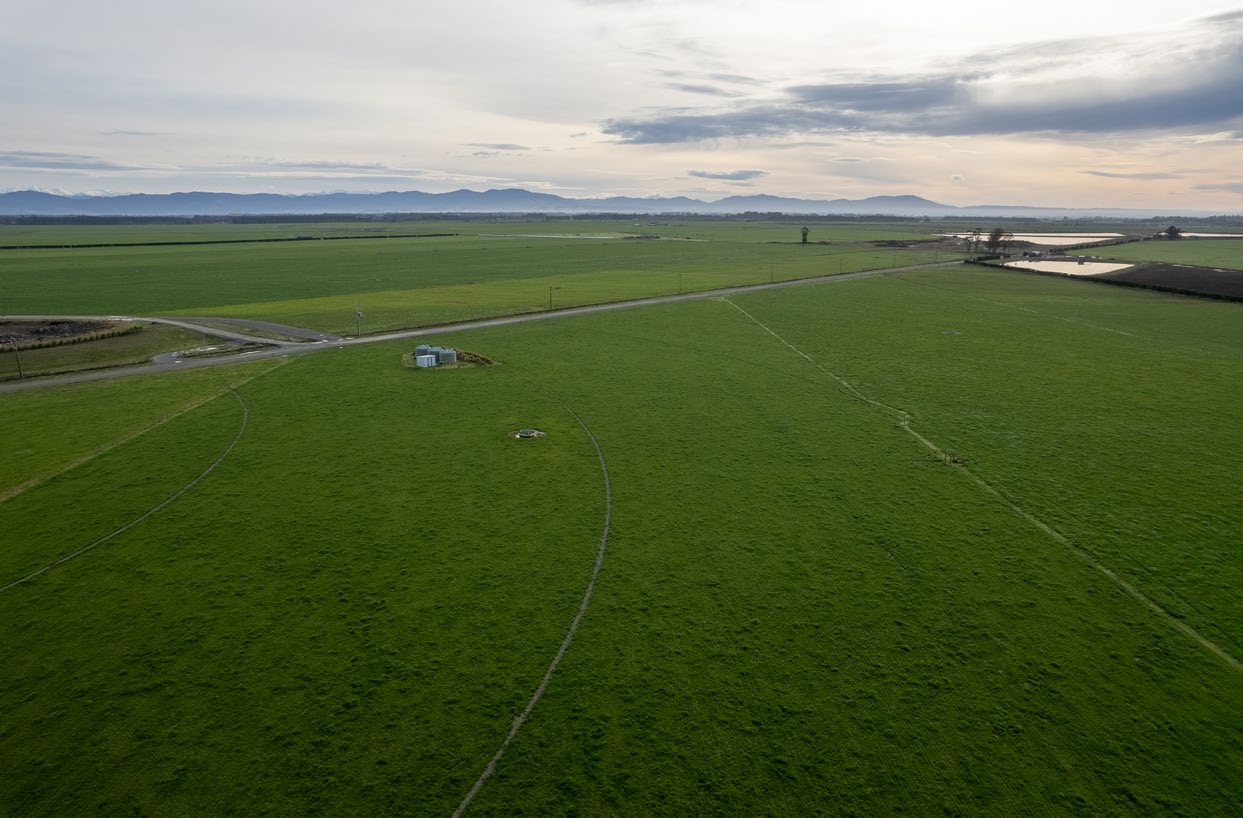
Drone shot of the Claxby farm.
Spencer-Bower was finding it increasingly hard to deal with people. “The trouble is in farming, there’s always people who need to talk to you, who need to sort something out, plan for the next thing,” he says. After a while, he didn’t even want to answer his phone.
On a winter Sunday, Sam and Jo were feeding-out to stock when Sam started to cry in the kale and didn’t know why. On another occasion, he was driving his ute and felt “really tight in the chest”.
One day he drove to the Waimakariri River. He sat on the end of one of the groynes, looking at the sparkling blue ribbons of icy water. Even under the big Canterbury sky, he felt like he was in a room with the walls closing in.
“The river was some relief because it was away from everyone, an escape from the pressures of the day,” Spencer-Bower says. “I remember thinking, ‘Oh, I just want to get out of this whole thing’.”After half an hour, he drove home.
A couple of months later, he happened to see John Kirwan on television speaking about mental health and something finally clicked. He sat down at his computer. “The first thing that I googled was ‘depression’ and ‘John Kirwan’ comes up and I thought, ‘Oh shit, is this what I’ve got?’”
Farming has always been a high-risk occupation in which economic wellbeing is tethered to factors far beyond the farmer’s control — the unpredictability of the weather or the global price of commodities like wool and milk. But in recent times those pressures have been multiplying in both number and complexity — and they are not always well understood by the broader public. Multi-million dollar mortgage millstones; new environmental regulations and more on the way; the uncertainties of a changing climate; the vicissitudes of the Covid-19 pandemic and seasonal labour shortages. Some of the sources of stress are less tangible and harder to explain — anxieties about the public perception of farmers, the tensions and expectations that come with running a family business and ensuring its survival for the future.
On top of all that, for men in particular, a traditionally stoic culture still makes it hard to ask for help or to even utter the “f” word — “feelings”.
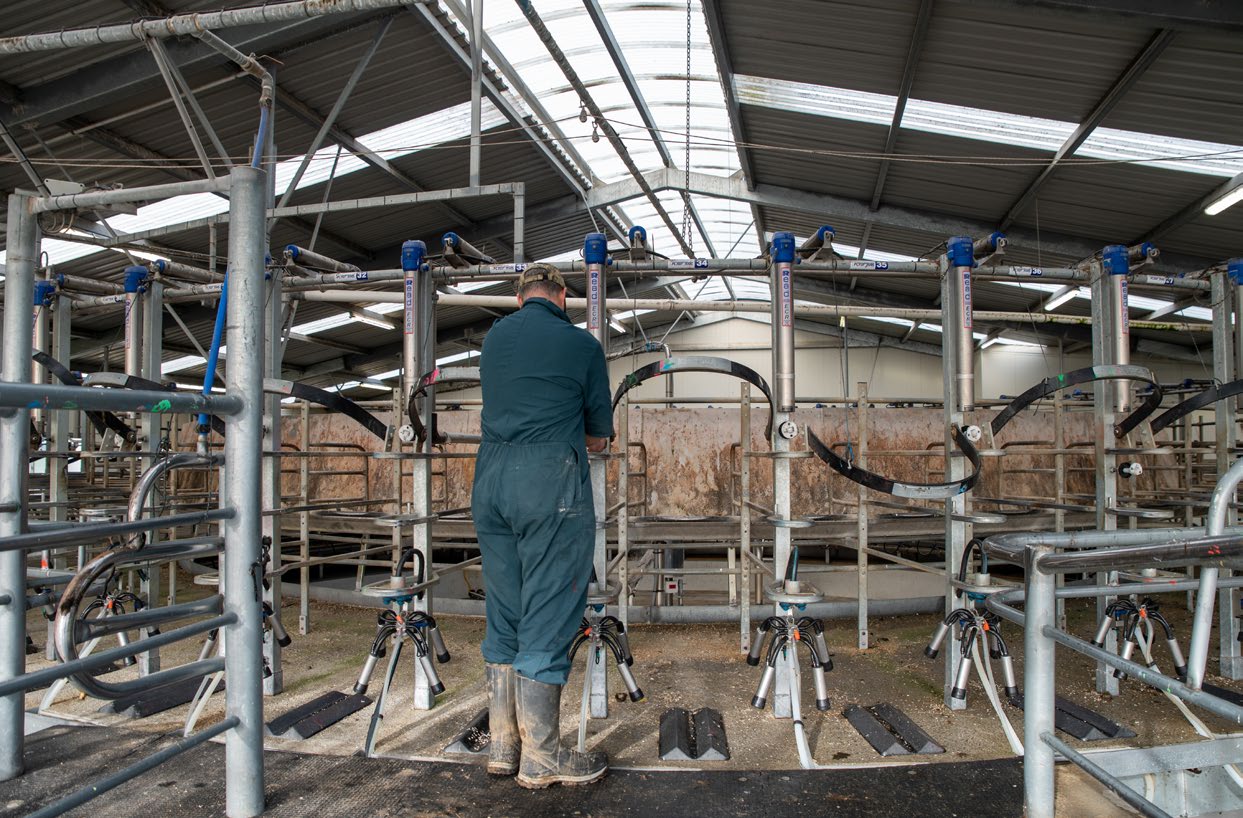
Spencer-Bower checking equipment in one of the farm’s three milking sheds.
For most of New Zealand’s history since the arrival of colonists, farmers were considered the backbone of the nation. “Our farmers were seen as carers of the land. They provided the food for New Zealand,” says Dr Fiona Doolan-Noble, a senior research fellow in the department of general practice and rural health at the University of Otago. “And now, in many ways, they are almost the devil incarnate.”
Doug Archbold, the patron and former chairman of the North Canterbury Rural Support Trust, believes the shift in public perception began in the mid-tolate 1990s, when there was a rapid expansion of dairy farming due to the falling profitability of sheep and beef. Around then, says Archbold, “the term ‘dirty dairying’ was coined”. Today, the runoff from intensive dairying is the main source of pollution in our waterways. But Archbold believes the New Zealand public doesn’t understand how “anti-farmer prejudice” affects farmers’ sense of self-worth.
At the same time, farming has never been more challenging. An ACC review of medical literature observed that farming is one of the 10 most stressful occupations in the world. “A farmer needs to be a geneticist, have IT skills, have HR skills. They need to understand their soils and pasture, they need to be a mechanic if something breaks down. You have to be a businessman too,” says Doolan-Noble.“Fred Dagg wouldn’t be cutting it these days.”
In recent years, the sense of precariousness has grown. One devastating crisis was the 2017 discovery of Mycoplasma bovis in a South Canterbury dairy herd. M. bovis is a bacterium that can cause mastitis, arthritis and late-term abortions in adult cattle and pneumonia in calves. According to the Ministry for Primary Industries (MPI), by this June 266 farms had tested positive for M. bovis and more than 171,000 cattle had been euthanised. Doolan-Noble, who with colleagues conducted a two-year study on the social and psychological effects of the disease, said MPI’s “badly planned and poorly executed process” had caused lasting harm. North Otago dairy farmer Rob Borst described the arrival of a slaughter team to researchers: “This guy pulls up and just shoots 10 [cows] in the yard . . . There was hysterics, there were staff crying. I just said to the guy, ‘You can’t do this. This is just heartless.’”
Climate change adds a new layer of uncertainty, with more extreme weather events expected from a warmer atmosphere. The recent flooding in Mid- Canterbury is an example of what we could see more of in future. The climate of entire regions is shifting in ways that have enormous implications for farmers’ financial stability. “Is Otago going to get drier? Northland, wetter?” says Doolan-Noble. “There’s all this stuff going on all the time. There are not isolated events — they become sequential or combining.”
And then there’s the politics. Farmers are often painted as the villains in New Zealand’s environmental policies — the polluters of rivers, other waterways and soils, and an obstacle to lower greenhouse gas emission standards.
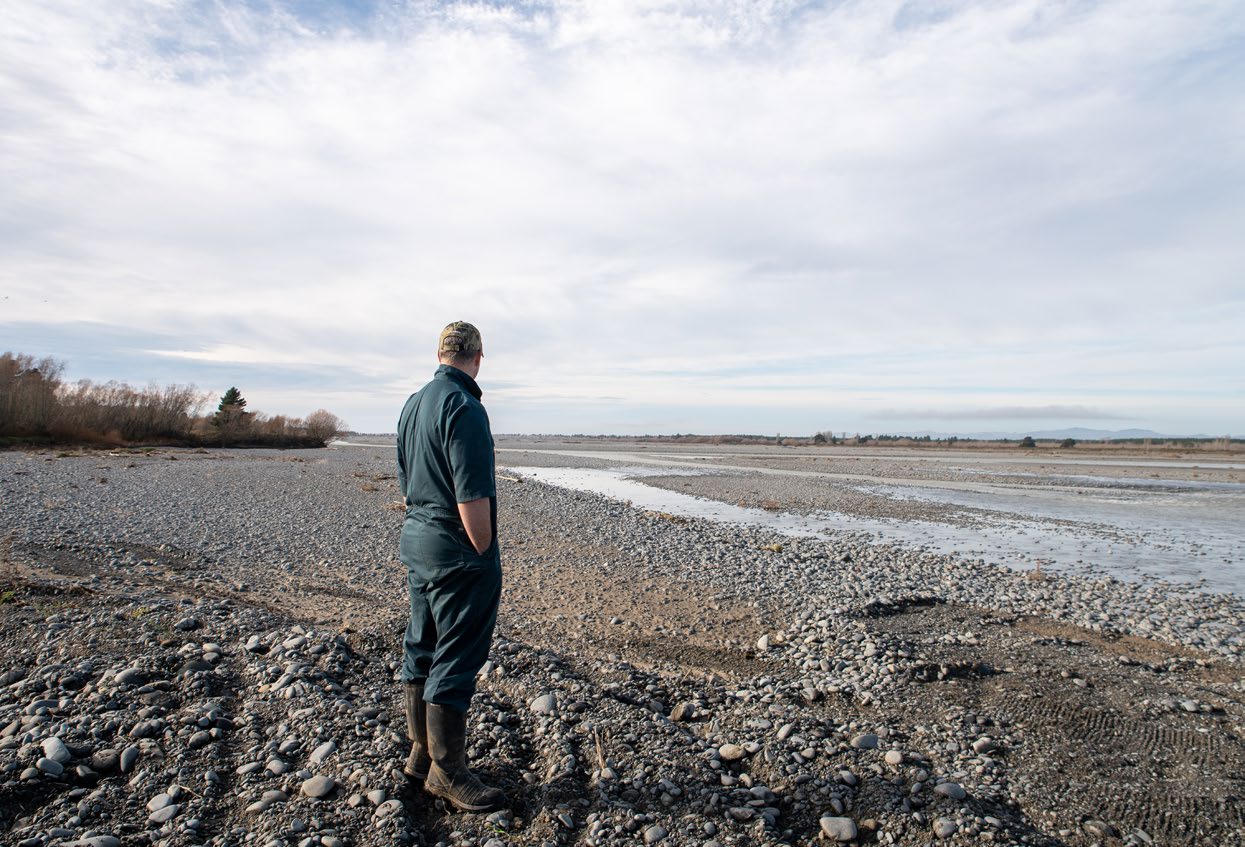
Spencer-Bower on the banks of the Waimakariri River.
The debate over climate change and water pollution in New Zealand presents an enormous source of stress to farmers because of the massive economic implications of regulations and the uncertainty over when or how laws will be changed. And the Climate Change Commission’s recent final report adds to that anxiety. From 2025, farmers will have to measure all greenhouse gas emissions from their farms and pay a yet-to-be-set price. Herd sizes will have to be reduced. Incoming regulations will affect the cost of utes and other farm vehicles. Freshwater management reforms affect stock setback from waterways, fencing, planting beside waterways and limits fertiliser use per hectare. All of this, Doolan-Noble says, adds “another layer of uncertainty into the world of the farmer, a world already inhabited by multiple uncertainties”.
Numerous people who North & South spoke to emphasised that negative public perceptions, especially about dairy farming, weigh heavily on farmers and their families. Jo Spencer-Bower recalls a day when her daughter came home from school in tears. “She said, ‘They played a video to say farmers are polluting the planet, but Mum we don’t do that, do we?’.”
To Sam Spencer-Bower, this “highlights the lack of balance and lack of in-depth scientific understanding being applied to agriculture’s environmental footprint”. He acknowledges that New Zealand has environmental issues to work on, particularly in water quality. But he feels there is “no recognition of the massive amount of work and money that has gone into the improvements made so far”. For many farmers, central government decisions can seem impersonal and uncaring.
Depression has for a long time been lurking in the background of rural life, but it is difficult to capture its true extent because there is still huge reluctance among many farmers to admit they are struggling. Archbold, for instance, recalls that his own father had depression. “While it wasn’t recognised at the time, my father became withdrawn and rarely spoke for days at a time. My mother somehow managed to get him through these periods – but even a suggestion of a visit to the local GP would have been summarily dismissed.”
“The first thing that I googled was ‘depression’ and ‘John Kirwan’ comes up and I thought, ‘Oh shit, is this what I’ve got?’”
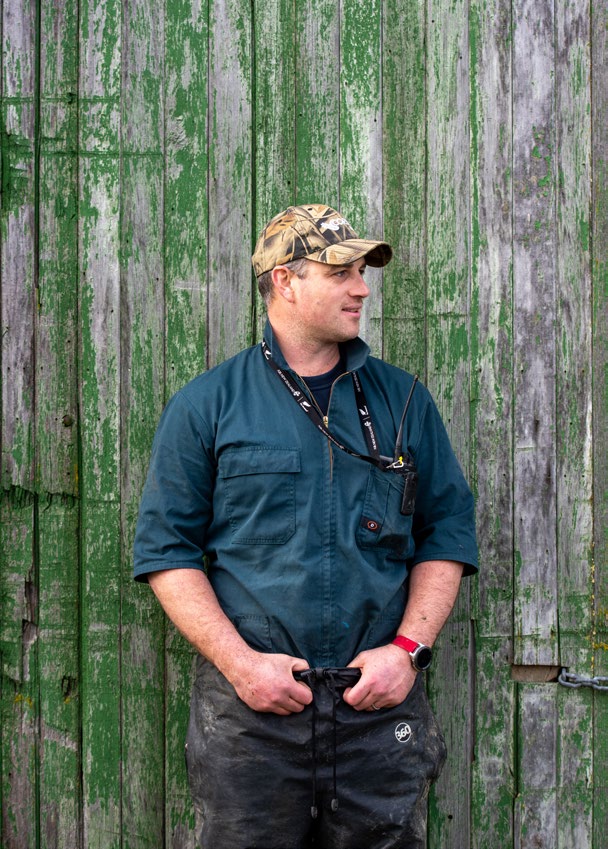
Spencer-Bower standing in front of the original farm shed.
Even if someone is willing to see a doctor, there is a well-documented shortage of GPs wanting to work in rural areas. And in small communities where everyone knows each other, bumping into someone you know in the waiting room is a major deterrant. Archbold recalls that he was once able to persuade a farmer to seek help by getting him to visit a medical centre 50 kilometres from his area, where no one would know him. He believes that the government’s health-sector reforms are an ideal opportunity to make mental-health services more accessible in rural New Zealand.
“I have had farmers who have rung me and I have had to get the police and psychological response services straight away. You’ve got to be direct with someone who rings up highly stressed, you don’t muck around. You say, ‘Are you thinking of topping yourself?’ You have to ask that. And if they say, ‘Actually, yes I am’, then the next question is, ‘Have you got a plan?’. Then you say, ‘I’m coming out’, and you ring the police.”
Not so many years ago, Southland farmer Jason Herrick, 43, was the epitome of the hard “Southern Man”. Brought up in Lumsden, he left school as soon as he could to go into farming, like many of his mates. He just wasn’t an “inside person”, he explains. He loved fishing and hunting and any chance to be outdoors.
He and his wife, Sandy, were share-milkers in Mid-Canterbury for 15 years. They were hit hard by several major snowstorms and then the 2010—11 earthquakes struck. So they walked away from that and moved to Duntroon in North Otago — “financially struggling and mentally struggling. Things like that knock your confidence for six.”
After three tough years, in 2015 they moved to Murray Creek farm between Lumsden and Mossburn. They had friends and family in the area, and while the climate had always been dry, the 415-hectare farm had a good irrigation system. It felt like a place where they would have “a bit of stability and reliability”, he says.
But that’s not how things worked out. In April 2018, an unusually long spell of wet weather set in. After months and months of rain, thick mud covered and oozed from every paddock and track. Every day, Herrick would come in from the farm with his wet weather gear completely covered in mud. It was hard to keep anything clean. They often had to rescue cows that got trapped in the mud and became exhausted trying to struggle free.
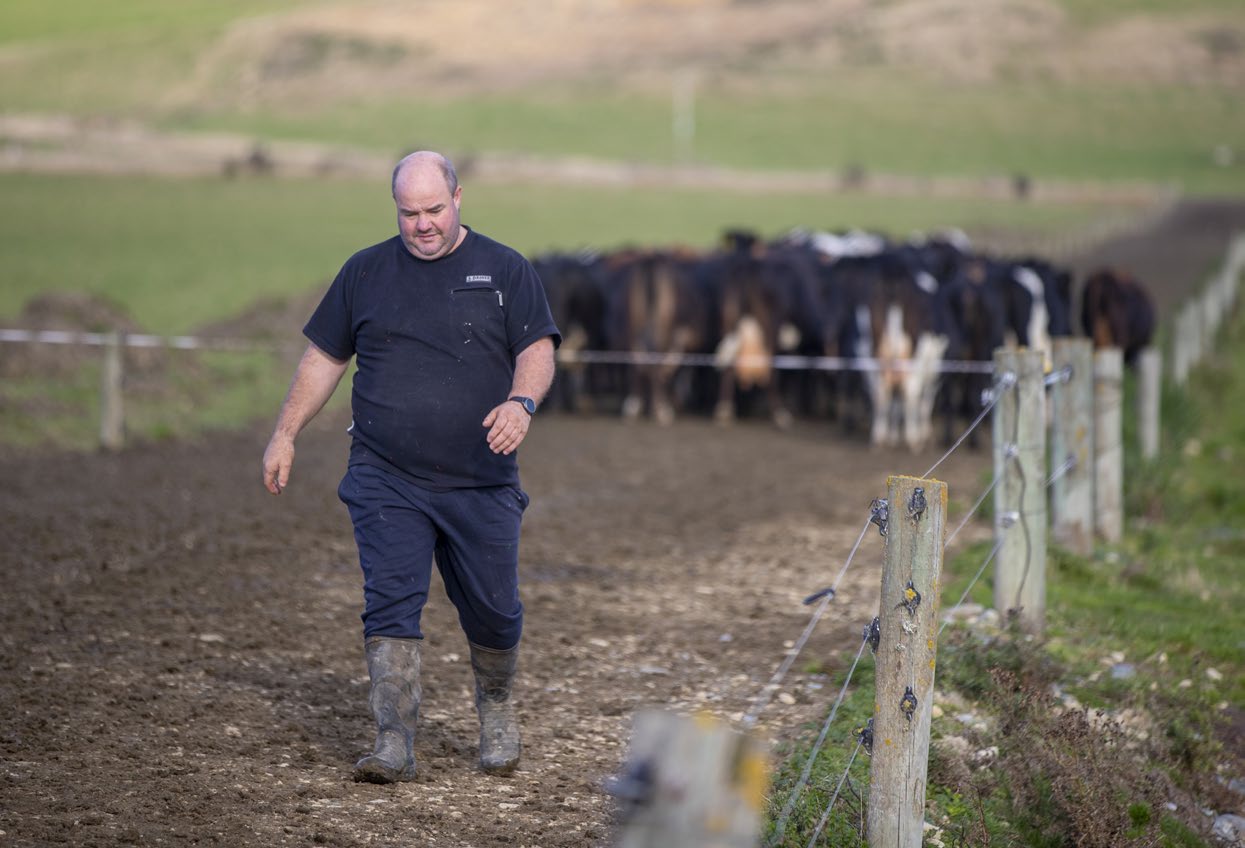
Jason Herrick. Photo: Stuff Limited.
Early one morning, Herrick was in the cowshed when a staff member said his motorbike had got stuck in mud in the paddock. Herrick went out to help him, and he got stuck in the paddock. Then they went and got the tractor — and that got stuck too. By the time the sun came up, the paddock was a mess — carved up by the cows and the tractor.
Herrick sat in the corner of the cowshed, caked in mud, and broke down sobbing. Eventually, he managed to scrape himself up off the floor and get through the day’s tasks. But by the end of the day, he says, “I’d made the decision [that] I’ve had enough of life.”
Herrick jumped into his truck and took flight from the farm.
“Before I knew it, everything had gone completely sideways. If it wasn’t for my phone and a certain police officer, I wouldn’t be here. They tracked me down via GPS, knew exactly where I was.”
“I don’t remember a whole lot from that afternoon.”
Between 2012 and 2020, a farmer died by suicide about every three weeks. That is 153 farmers or farm workers, according to the Ministry of Justice. That includes wives, contractors, labourers, technicians, managers and students, and members of other “farming occupations”. More remote rural areas had more suicides, with the highest number in the Waikato (33) and Southern DHB (30) regions. The vast majority (135) were men, with 20-to-24-year-olds having the highest toll by age (23). Research by suicide expert Dr Annette Beautrais confirms that suicide rates are highest among younger farm workers — often young men who have grown up in a semi-urban area and struggle to cope with the transition to rural life.
Because of the nature of the work, those who are struggling have access to the means of self-harm — both poisons and firearms are necessary tools for the job. The vast majority of legal firearms in New Zealand are licensed to those in rural areas. A study of farmer suicides by Beautrais found that a gun was used by 40 per cent of farmers who took their lives between 2007–15, compared with just 8 per cent in the general population.
But the statistics don’t capture the full story. One death has a ripple effect throughout families and communities. Grace Curtis, 23, suffered severe post-traumatic stress disorder after her father John took his life on their North Canterbury farm near Amberley. He had been struggling with alcohol abuse for some time, but on several visits to the family doctor, he was sent home without a subsequent check-up or referral. Attempts to admit him to hospital resulted in discharge within a few hours, and because of patient privacy, the family couldn’t find out what had happened.
“You’ve got to be direct with someone who rings up highly stressed, you don’t muck around.”
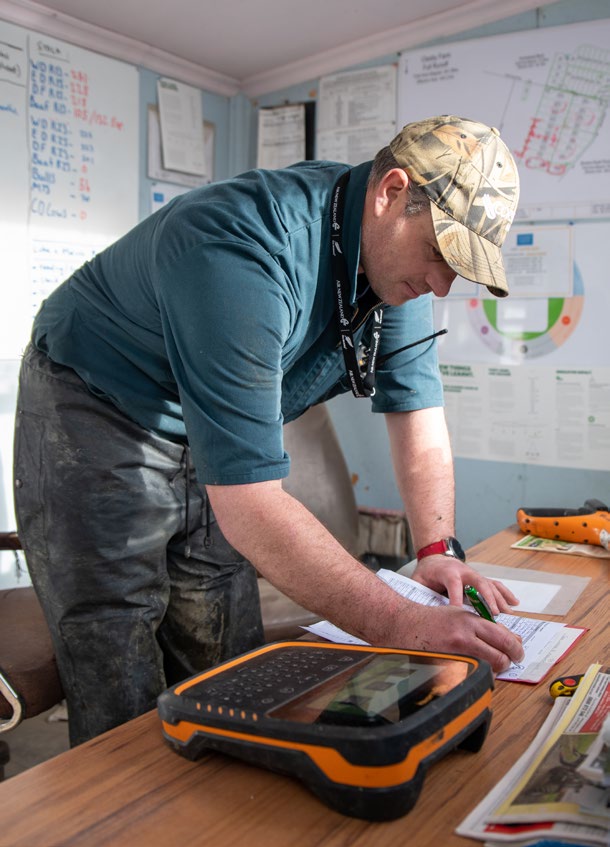
Spencer-Bower doing some stock rotation administration in Claxby’s original office.
In January 2020, Curtis was driving out to the farm to have an afternoon beer with her father when she found his body. “For the best part of a year after this we were absolutely lost, and some days still feel very lost and empty.” Rural mental health support needs are different to those in urban areas, she says. One of the biggest differences is “suicide exposure”.
“I am gravely concerned for the amount of people struggling with these daily suicides and then being left on their own to navigate their new and mostly depressing life,” she says. “Families are going from losing one member of their family to suicide to swiftly shifting attention to the next ‘most at risk’ family member. It is a scary place for a family to be in.”
It took six days after her dad’s death before Curtis received a text from a support service. She and two friends who also lost fathers to suicide have started the Cool Change NZ Campaign in which they share bereavement stories, aim to prevent suicide and prioritise mental wellness.
This is one of an increasing number of efforts by farmers to provide support for mental illness and reduce the stigma of depression. Others include the national Farmstrong initiative and the “Resilient Farmer” programme founded by Marlborough farmer Doug Avery, who wrote a ground-breaking book about his own struggles with depression and drought. Whereas Fieldays used to be devoted entirely to techniques to increase milk or meat production, there are now often specialists in mental health there too.
Experts also credit the younger generation of farmers and their partners for taking a more enlightened view of mental health. Farmers like Jason Herrick.
On the day of his breakdown in 2018, Herrick was taken into the mental health system — “which people don’t even know is there” — and received counselling and medication. He came home about a day later but received continuing support. When a friend took him away for a week-long break, the Rural Support Trust arranged for someone to manage his farm while he was gone.
About nine months later, in August 2019, Herrick was watching rugby at home when a friend called to say that something strange was happening out the front of his farm. Herrick drove straight there and found a group of environmental activists with torches and cameras, looking for cases of animal mistreatment. After Herrick, who prides himself on his high standards of agricultural practice, confronted them, he says they shifted to accusing him of being “bad for the environment and bad for the country. It brought a whole lot of things back, my feelings of that day in 2018.”
The following week, Herrick and three other farmers got together for a barbecue in Mossburn outside one of the activists’ houses, which made national news. Later that week, they co-founded the Ag Proud Trust, which seeks to celebrate rural achievements, change public perceptions of farming and raise awareness of mental health.
And Herrick started talking in public about his own struggles. “I was one of those people who would say, ‘eat a concrete pill’,” he explains.
“The Southern Man thing goes right from an early age. When boys are 2, 3, 4 years of age, a boy falls over, hurts himself and cries, the first thing his old man says is ‘Harden up, stop being a girl’. I used to be like that.”
“Farmers traditionally have been people that will isolate themselves, box themselves into a corner and not reach out. And I still know quite a few like that.”
“I’d go to the pub and us blokes would all be sitting around a table and talking about farming and the weather and so on, and you could just hear in the background all the ladies sitting over in the corner talking about their feelings and their kids and the struggles that they’ve had that week. It was like, ‘Harden up ladies, come on’.”
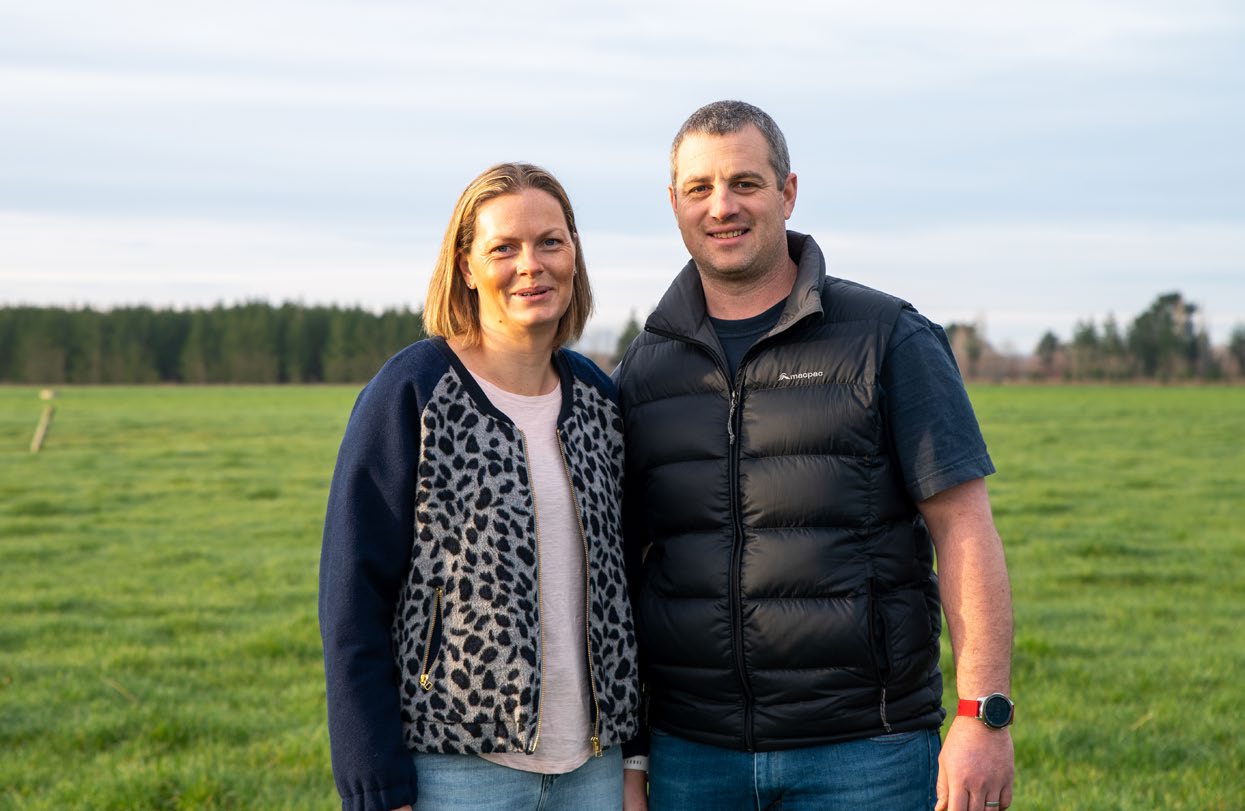
Sam and Jo Spencer-Bower.
Since his breakdown, Herrick has found counselling useful, but says the biggest help was Sandy, his family and his closest friends. He is no longer on medication, has stopped drinking to cope with pressure, and uses exercise, largely cycling, to create endorphins to pick him up.
Farmers are getting better at asking for help, too, he says. “Now, if I’m with a bunch of the boys, I’ll ask them how their week has been, how they are feeling. Most say they are fine and I reply with, ‘Are you really?’. Some say, ‘Yeah mate’ but some will say ‘It’s been a bit tough lately’, which we can then have a chat about.”
A few months ago, Herrick resigned from Ag Proud and is now on the executive board for Federated Farmers in Southland. He still thinks almost every day about leaving farming. But in the end, he says, he doesn’t “just want to be Joe Bloggs out there driving a truck”.
“This is as good as it gets,” he says on the warm, sunny day that we visit the farm. There’s a gentle nor’wester blowing through the pine trees around Murray Creek and just a few clouds in the distance over the Fiordland mountains. His dogs Mystro, Trev and Fletch follow along as we look at the fields of kale growing for winter feed.
“When it’s pissing down with rain, and it starts snowing on top of that, and you’re knee-deep in mud, you stand out there and think, ‘Why the hell am I doing this?’. “I do that to get to this. Because 90 per cent of the days here are actually beautiful.”
Sitting around the dining table in the large, open-plan living area of their home, Sam and Jo Spencer-Bower talk easily, never interrupting one another, occasionally looking at the other as if for tacit approval before raising the next issue.
Sam went to the doctor towards the end of the 2012 winter, about a week after he’d seen John Kirwan on TV and finally put a name to his own struggles. “You think ‘Depression’— you think, ‘That’s what other people get,’” he says. Now, the couple say they both perceive Sam’s struggles more clearly. “It felt like it just happened one day,” he says. “But it had been building. Like a rubber band, you can stretch and stretch and stretch.”
The doctor, Spencer-Bower recalls, was “very helpful and understanding, told me how common it was”. He prescribed medication and arranged for Sam to see a counsellor. Jo recalls him being at “rock bottom” for at least a month. But after he started taking medication and sharing his difficulties with her and others, “it felt like we were seeing light out of this black tunnel”.
Spencer-Bower adds that he “never really felt suicidal. Never, really. You might make flippant comments about it when you were feeling crap.”
Jo sees things a bit differently, telling him that she was often anxious during that period. “You started doing a bit of homework of what depression is, and you hear stories about people going down to the back paddock and not coming back.”
Spencer-Bower says he understands that depression affects everyone differently and for some people suicide might feel like the only way out. “Whereas I always thought, there’s too much to lose here to do something like that.”
“You still had that pressure to not fail,” Jo agrees. “The thing that was getting you down and making you struggle was probably that expectation, but that expectation was keeping you with us and alive, in a really weird kind of way.”
Negative public perceptions can weigh heavily on farmers and their families.
Even with medical help, a two-week break with Jo’s parents, and advice from Kirwan from his website and book All Blacks Don’t Cry, it was well into the following year before Spencer-Bower felt he was functional and largely back to normal, work-wise. Counselling has helped him to be less hard on himself and to spend less time over-analysing social situations, he says.
“I’m learning to not worry. I think I was always a worrier, when I was young. Probably more prone to depression, those kinds of personalities, naturally an introvert and shy.”
He has attempted to go off medication a couple of times but felt the depression returning and is still on a low dose today. He does his best to take time out for exercise and hobbies, and still goes to the doctor every few months for a check-up.
“After a busy week or a lot of pressure building up, or something has gone wrong and you wish it would go right, you can feel it coming back. I’ve got better at feeling when it’s coming and going, ‘this is just crap, it’ll pass’.
Will they stick with farming?
“Look, there were a few years there where it was like, yes, no, yes, no,” Spencer-Bower says. “But now we are really starting to understand what happened and why.”
For both him and Jo, a big reason to keep going is their daughters Chloe, 8, and Ruby, 6.
“I do really love farming,” says Spencer-Bower. “I like that our kids can grow up on a farm. They love it too. I basically just enjoy growing and producing crops and food. I enjoy looking after a patch of land and now enjoy seeing staff and their families develop and make a home on the farm and be part of the Claxby legacy.
“I enjoy how our whole family can be involved with the farm. [But] it tests the marriage and things at times.”
He says Jo has been his biggest source of strength. “Some people who don’t have someone like that to turn to, who knows what they end up doing.”
These days, whenever Spencer-Bower has to drive out to the river to check on the irrigation, he tries to take a breath. He takes in the power of the river and drinks in some solitude. And he tries to be thankful for everything he has and everything he has learned.
“When you look back, to be honest it’s a good thing it happened. And you look at other people who have been depressed and come out the other side — they are better for it. They’ve had to retrain their thinking, they’ve understood it, sorted out habits that may have led to it.
“I’m always going to have to work on those things.”
Paul Gorman is an award-winning Christchurch science and environment journalist.
This story appeared in the August 2021 issue of North & South.
